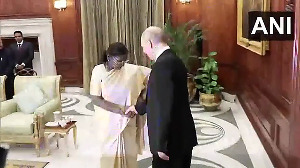Hyderabad didn't just shatter the lives of families who lost their kith and kin, but also a myth that was taking root, that we are developing the competence to keep terror out of the day-to-day worries in India, says Brigadier S K Chatterji (retd).
The Hyderabad blasts of February 21 were certainly not unexpected. While 26/11 Mumbai attack terrorist Ajmal Kasab's hanging may not have caused so much consternation in the camps of Indian terrorist groups, the hanging of Parliament attack convict Afzal Guru is a different story altogether.
Here was an Indian terrorist from the state of Jammu and Kashmir, convicted for masterminding an attack on Parliament, who had been hung by the Indian State. While the Inter-Services Intelligence may have even tried to hold back an immediate response to Kasab's hanging by the Lashkar-e-Tayiba, fearing an inevitable charge of aiding and abetting, Afjal Guru's hanging posed a different set of challenges for the Indian terror establishment.
If they were not to retaliate, a series of setbacks stared them in their faces.
First and foremost would have been the lowering of morale in the rank and file, which would have found its leadership wanting. Here was their poster boy, done to death by the State, and the terror establishment not having enough muscle to post a violent response.
Definitely the leadership of the Indian Mujahideen, the group reportedly behind the blasts, would have faced serious problems with its mujahideen losing faith in their capabilities.
The lack of a violent response would also have established psychological ascendency of the Indian anti-terror forces over our home grown terror groups while enhancing the former's credibility.
It would have served as an indicator of the fact that the steps taken post the Mumbai attacks have yielded substantial results.
The confidence of the citizen in the capabilities of our police forces would have increased and paved the way for better intelligence inputs.
The leadership of groups like the Indian Mujahedeen would also have been questioned by other smaller groups. Terror groups resort to violence not merely to instill fear in the population, but also to display their capabilities to similar organisations and thus establish their supremacy within their ilk.
Two somewhat similar cycle-based improvised explosive devices blowing up within minutes of each other establish a few additional facts.
Foremost among these, is the blasts having been staged by one or more organisations that are ultimately under the command of a single leadership that decided on the type of device to be used, timing and targets.
The fact that the locations were not exactly contiguous indicates the capability of its organisers to stage such attacks simultaneously in different areas. It reflects on the training of their men and women.
Should we face such blasts in other cities, it will certainly be proof of greater reach of the terror establishment.
Apparently, we have witnessed some improvement in the situation in India, post the Mumbai attacks. No major attacks; at least not comparable to 26/11. The improvement can be attributed to our capability enhancement, or the ISI's reluctance to stage major attacks in India due to adverse global reactions to Mumbai 2008, strengthened by the David Headley case.
Even the Kashmir valley has experienced a decline in terror attacks. Notwithstanding the above assessment, what is equally true is the fact that even with all agencies involved in anti-terror operations, surely anticipating a riposte after Afzal Guru's hanging, the attacks in Hyderabad went through with relative impunity.
Intelligence sharing between agencies, centralised databanks, coordination between multiple departments of the government at the Centre and in the states, superior training, equipment and accountability are all issues of import in the battle against terror.
We did learn a few lessons post 26/11. But, even today, our National Counter Terrorism Centre remains in its conceptual stage.
At this rate, will we only learn in fits and bursts, and that to after we face major attacks in the future?
Terror in India will be kindled more strongly as the State machinery in Pakistan gets weaker and weaker and the likes of Mohammad Saeed have greater sway. Should the Afghanistan situation deteriorate, as anticipated, after the US withdrawal in 2014, the weaponry available to terror groups and also access to funds will be far more.
Our homegrown outfits have their network of sleeper cells that await activation at the appropriate time. The Naxalite insurgency has not been addressed vigorously either. With such multiple threats, there is no choice but a far more focused approach by our policy makers.
Hyderabad didn't just shatter the lives of families who lost their kith and kin, but also a myth that was taking root, that we are developing the competence to keep terror out of the day-to-day worries in India.
Unfortunately, terror is definitely not on the wane. Let us not suffer from any such delusions.





